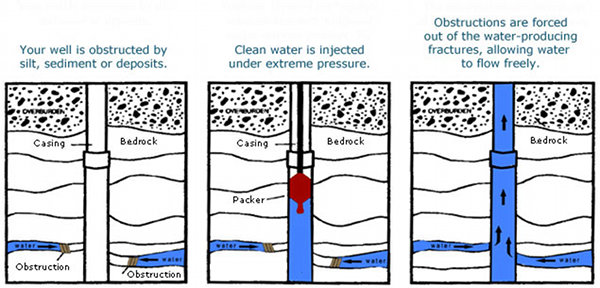Key words :
future energies,
,
epa
,shale gas
,duke university
,fracking
,hydraulic fracturing
,university of texas
Fracking Does Contaminate Groundwater With Methane, But Jury Still Out On Process Overall
13 May, 2011 12:15 am
A study by Duke University has shown unsafe levels of methane gas in water taken from wells closer than 1000 m to gas-shale hydraulic fracturing ("fracking") operations. Results from ongoing studies by the University of Texas and the US Environmental Protection Agency are awaited with interest, since it is predicted at 45% of US natural gas production will be shale-gas by 2035, but presumably only if the process is deemed safe.

A study has been undertaken by Duke University of methane levels in water from 68 private wells above the Marcellus and Utica shales in Pennsylvania and New York. The details have just been published in the Proceedings of the National Academy of Sciences http://www.pnas.org/content/early/2011/05/02/1100682108.full.pdf+html. Of these, around one third were in an "active extraction area", which by definition is within one kilometre of a gas well, the remainder being more distant.
The results of the study are striking: in all but one case, making 15 altogether, it is only within 800 metres of a gas-well that levels of methane are high enough (10 - 28 mg/L) to merit warning of the occupants and prudent remediation down to levels ; 10 mg/L, according to the US Office of the Interior, or above 28 mg/L at which point "potentially explosive or flammable quantities of the gas are being liberated in the well and/or may be liberated in confined areas of the home," which requires immediate mitigation. http://arblast.osmre.gov/downloads/Mine%20Gases%20and%20Dust/FINAL-Methane.pdf
In this particular study, no evidence for fracking fluid finding its way into the groundwater was found nor for intrusion from deep saline brines into aquifers closer to the surface. According to an isotopic analysis, the excess methane is consistent as originating from deeper thermogenic sediments, rather than being produced biologically in near surface environments.
The Energy Institute at the University of Texas is set to conduct the first integrated study of the science, policy and environmental issues surrounding hydraulic fracturing to recover shale gas at a cost of $300,000, with preliminary findings expected to be released in October. This project aims to combine an independent assessment of groundwater contamination, fugitive air emissions and seismic events for which fracking has been blamed in shale formations, and to evaluate the effectiveness of legal regulations attendant to the process, focussing on Barnett Shale, which extends under over 20 counties in North Texas . The Environmental Protection Agency is conducting its own investigation with results expected after the end of the year 2012.
The overall conclusions of these studies could not be more crucial to future US energy provision. Production of shale-gas was 2.02 trillion cubic feet (Tcf) in 2008: a 71% increase over the previous year, which in 2009 grew 54% to 3.11 Tcf. Proven US shale reserves at the end of 2009 were observed to increase by 76% to 60.6 Tcf. In its Annual Energy Outlook for 2011, the US Energy Information Administration (EIA) more than doubled its estimate of technically recoverable shale-gas reserves to 827 Tcf from 353 Tcf, by including exploration data taken from new fields such as the Marcellus, Haynesville and Eagle Ford shales. It is estimated that shale-gas production will increase from 14% of total US natural gas production in 2009 to 45% by 2035. But this of course depends on whether the process of hydraulic fracking is proved sufficiently safe to be so widely adopted.
Key words :
future energies,
,
epa
,shale gas
,duke university
,fracking
,hydraulic fracturing
,university of texas
-
12/12/12
ÂPeak Oil is Nonsense Because ThereÂs Enough Gas to Last 250 Years.
-
05/09/12
Threat of Population Surge to "10 Billion" Espoused in London Theatre.
-
05/09/12
Current Commentary: Energy from Nuclear Fusion  Realities, Prospects and Fantasies?
-
04/05/12
The Oil Industry's Deceitful Promise of American Energy Independence
-
10:00
Shaky Foundations for Offshore Wind Farms







 Read more
Read more